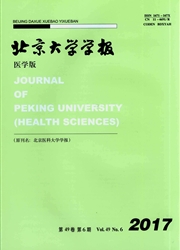

 中文摘要:
中文摘要:
目的探讨类风湿关节炎(RA)患者人类白细胞抗原(HLA)-DR4/1表型与流感病毒血凝素(HA)308-317多肽特异性T细胞增殖和血清抗HA308-317抗体之间的关系。方法将HA308-317多肽与70例RA患者外周血单个核细胞(PBMC)共孵育5d,^3H掺入法测定T细胞增殖。用ELISA法检测RA患者血清HA308-317抗体水平。以序列特异性引物聚合酶链反应(PCR-SSP)技术对RA患者进行HLA-DR分型。结果在70例RA患者中,27例HLA-DR4/1表型阳性。其中,HA308-317多肽可刺激T细胞增殖的RA患者有17例(62.9%),10例无反应性;15例(55.6%)HLA-DR4/阳性RA患者抗HA308-317抗体阳性。在HLA-DR4/1表型阴性的RA患者中,T细胞对HA308-317多肽有反应性者10例(23.3%),无反应性者33例;25例(58.1%)患者抗HA308-317抗体阳性。HLA-DR4/1表型阳性组HA308-317特异性细胞增殖高于HLA-DR4/1表型阴性组(P〈0.01),但两组血清中HA308—317抗体水平差异无统计学意义(P〉0.05)。结论RA患者HA308-317特异性T细胞增殖与HLA-DR4/1表型有关,HA308-317抗体生成与HLA-DR4/1亚型无明显关系;HA308—317多肽可能通过诱导HLA-DR4/1特异性T细胞活化参与RA的发病。
 英文摘要:
英文摘要:
Objective To investigate the relationship between HLA-DR4/1 subtypes and T cell response to influenza virus hemagglutinin (HA) as well as anti-HA308-317 antibodies in rheumatoid arthritis (RA). Methods The peripheral blood mononuclear cells (PBMCs) from 70 RA patients were cultured with HA308-317 for 5 days. T cell proliferative responses to HA308-317 were evaluated by [^3H] thymidine incorporation assay. ELISA was used to detect the antibodies to HA308-317. HLA-DR4/1 subtypes were analyzed by PCR with sequence-specific primers. Results Twenty-seven of the 70 RA patients (38.6%) were positive for HLA-DR4/1 subtypes and 43 patients (61.4%) were negative for HLA-DR4/1 subtypes. In the HLA-DR4/1 positive group, T cell proliferative response to HA308-317 was observed in 17 (62.9%) RA patients and anti-HA308-317 antibodies were present in 15 RA patients (55. 6% ). In the HLA-DR4/1 negative group, T cell proliferative response to HA308-317 was observed in 10 (23.3%) patients and anti- HA308-317 antibodies were present in 25 (58.1%) patients. T cell proliferative response to HA308-317 in the HLA-DR4/1 positive group was higher than in the negative group (P 〈 0. 01 ). However, there was no significant difference in production of antibodies to HA308-317 between the HLA-DR4/1 positive and negative groups ( P 〉 0. 05). Conclusion There is a relationship between HLA-DR4/1 subtypes and T cell response to HA308-317. Antibodies to HA308-317 are not associated with HLA-DR4/1 phenotype. HA308- 317 peptide may be involved in the pathogenesis of RA through activating HLA-DR4/1 specific T cells.
 同期刊论文项目
同期刊论文项目
 同项目期刊论文
同项目期刊论文
 期刊信息
期刊信息
